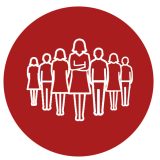The objective of this workshop is to provide academic-led information about what is needed for promotion at each academic career stage. The speakers at these events include Pro-Vice Chancellors, Chairs of Faculties and members of the University Promotion Committee.
Workshop to enhance transparency about the selection/promotion process and the criteria for promotion
Main aim of the action
Expected impact
More staff would be successful in getting promoted. A smaller proportion of staff would consider that there is limited transparency in the promotion process leading potentially to greater trust towards the institution and its processes.
Implementation
According to staff perceptions based on a University staff survey, there is limited clarity and transparency regarding the promotion process in the University. Women anecdotally suggested that there was limited understanding about promotion process. The lack of transparency might prevent individual staff from applying for promotion. Considering that a) women are less likely to apply for positions when they do not fulfil all the criteria and b) might be less encouraged from senior staff (often men occupy these positions) , women are less likely to submit an application/ less likely to ask for help or the right questions.
This event requires liaison between HR, senior leadership team and members of the committee(s) for academic promotions. It is important to establish and decide the content and the format of such an event depending on the needs identified through the audit. Individuals responsible for this event should identify potential career pathways (e.g. academic/teaching only/research only) and career progression levels (for example from research fellow to senior research fellow or associate professor to full professor) where necessary. Then identify and invite in advance individuals in the institution that participate in such decisions to provide clear information for different pathways and levels along with senior HR person. Time should be allocated for questions and answers and individual slots (one to one or small group) depending on needs of the participants. Moreover, faculty representatives to ensure that disciplinary differences are taken into consideration.
Resources/skills/incentives required
HR team responsible for promotions along with equality and diversity at first to ensure that the content is not gendered along with a researcher on gender. Senior academic buy-in from those on relevant committees. Budget for refreshment/lunch for participants because it facilitates informal conversation.
Challenges/Resistance
Staff may not think it is necessary especially if the information is published but there is space to ask questions senior members.
Coping strategies
Be clear about the benefits of attending such an event and ensure that you get and respond to feedback from participants.
Communication
Staff Newsletter (university -wide). Departmental administrators (HR and/or Head of Department) forwarding information to staff for this event. Encouragement from the Head of Department to attend would be useful. We communicated this action as part of responding to the survey results about lack of clarity and transparency, the University has decided to run this event to enhance information about the promotion process and enable participants to get an insight and raise questions in relation to this process.
Results
Until 2016, 160 attended the event. Numbers attending/going for promotion/succeeding in promotion. 20 individuals who attended the event applied for promotion and 18 of them were successful suggesting that the event was useful in providing an overview of the promotions process and potential enhance the likelihood of being successful. In terms of gender 7 out 8 women who attended the event and applied for promotion were successful.
Evaluation
More staff are successful in getting promoted. A smaller proportion of staff would consider that there is limited transparency in the promotion process leading potentially to greater trust towards the institution and its processes.
Creating an open space to ask questions without feeling embarrassed within and beyond the event.
Evaluation tools
- Staff Survey by gender over time for clarity/transparency of promotion
- Data on participation to event/promotion applications/successes by gender
- Attendees who applied for promotion each year and their success rate compared with non attendees and by gender
- Data on interest for the workshop over time
- Qualitative data: Is the event useful? Why? What is missing? Is there a gender element? What do women/men thing about the process and what are their recommendations?
Lessons learnt/transferability/reflection
Monitor whether there is demand for and tweak accordingly based on the needs of the targeted participants. For example, in one event we did breakout groups to target sub populations e.g. Staff who gave had a career break. But the event needs to be flexible depending on demand. You could consider organising small discussion groups by type of promotion. Explore why not enough people attended, whether part of long tem goal of this event is achieved. Furthermore, it is important to take into consideration logistic issues such as whether room is big enough or there was enough food/coffee.
Key area
Recruitment, career progression and retention
Type of action
Training/workshop
Organization
University of Warwick (WARWICK)
Higher education institution
Action level of implementation
All staff interested in promotions and mentors in terms of their role in supporting junior staff.


